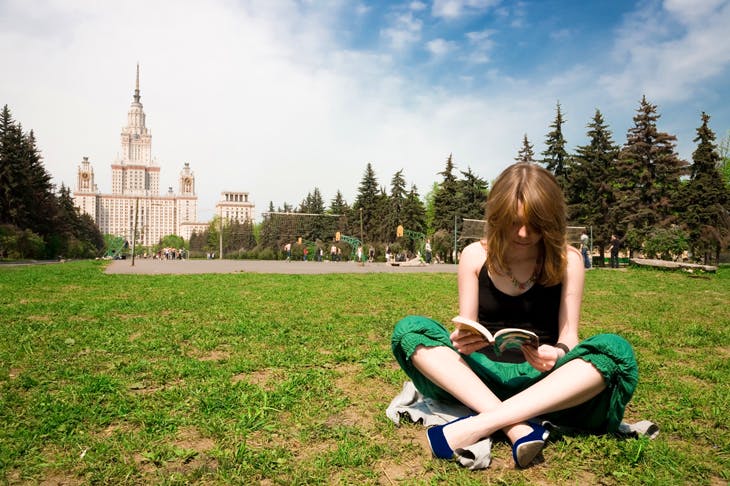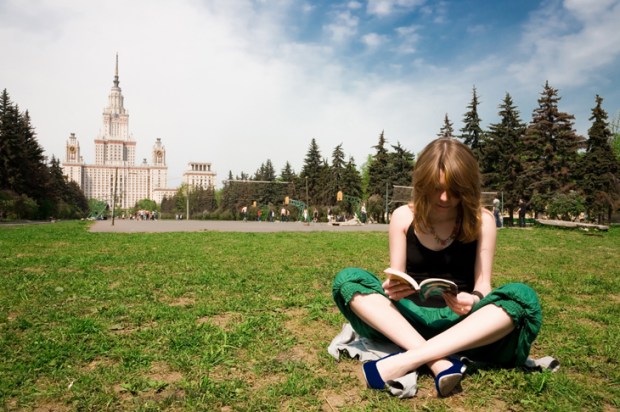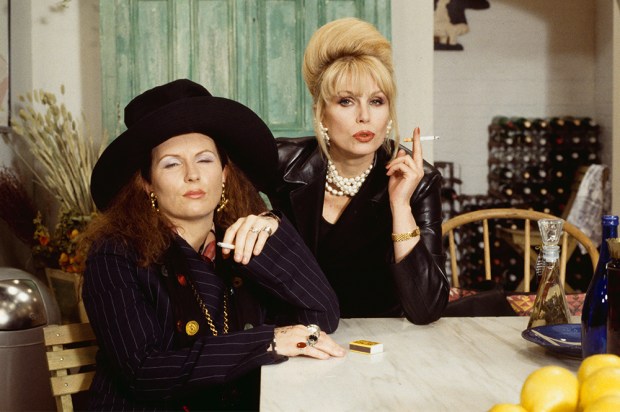In December I was in a group of writers on a British Council visit to Moscow, where the UK was the guest nation at the Moscow Book Fair. This entailed going to art galleries, restaurants and to the Bolshoi as well as giving various talks. The hunger for books at the fair itself was extraordinary. Young people queued with armfuls of the latest Jim Crace, Jonathan Coe, Julian Barnes or Marina Warner in the hope of a signature. Used as we are to the apologetic €1,000 advance and talk of young people not reading any more, this was heady stuff. One night my Russian publisher, Alexander Andryuschenko, took me and my son William, who was passing through, to dinner at the Pushkin restaurant because he says it is the only place you can get ‘real Russian food’. We ate meat and smoked fish in a semi-frozen state, as it was in the old days when it was dug out from under the snow at the beginning of spring. It was wonderful. Mind you, the three of us drank a whole bottle of vodka with it, so we were inclined to the positive.
Last time I was in Moscow was in 2000. The hotel lobbies then swarmed with prostitutes, Goldman Sachs salesmen and Russian gangsters — an oddly homogeneous group. On the surface, those Wild West days are now over; things seem more orderly. Yet there is a nostalgia for Stalin and a sense of the past creeping back. You see this in the hatchet-faced security men, who look like former Gulag guards. One such official was making life difficult for Sir Ian McKellen when he went to Moscow a few months earlier as part of the British Council Shakespeare festival. Back and forth went Sir Ian’s passport, back and forth the sullen scrutiny from page to face till suddenly… ‘Gandalf!’ The guard leapt with joyous recognition, put his arm round the famous actor and begged to be allowed a selfie. This is how culture reaches the parts that mainstream diplomacy cannot.
Watching the enjoyable Brontë drama To Walk Invisible the other day on television, I was brought up short when Charlotte told Emily that their books would be ‘rubbished’ by male critics in London. Such anachronisms crop up in all period dramas, but would be easy to fix if someone with an ear for language was asked to skim through the script before it was filmed.
Which brings us to The Crown. I think we all enjoyed Claire Foy’s shot at the Queen’s voice and Vanessa Kirby’s smoky Princess Margaret. (Not sure why they gave Prince Philip a teddy-boy haircut. Surely all they have to do is copy the photographs?) But The Crown also had some ‘going right down to the wire’, ‘it’s a learning curve’, moments. Not literally those ones, but almost as bad. If you are spending £100 million on a series, as the producers are said to have done on this one, wouldn’t ten grand an episode to take out the clunkers be a worthwhile investment?
One of the many sad deaths last year was that of the film producer Simon Relph. I worked with him and his business partner Ann Skinner 20 years ago when we tried unsuccessfully to make a film of my novel Birdsong. To say that Simon was the last gentleman of the British film industry may sound like faint praise in a world where even bothering to return a phone call is considered pretty fancy. But he was a force for good. He began (I learnt from a Scotsman obituary) as third assistant director on Carry on Cruising in 1961. He produced, among many other films, John Schlesinger’s Yanks, Warren Beatty’s Reds, and Hideous Kinky with Kate Winslet. As head of the British Screen Finance Corporation, he discovered and encouraged a new generation of talent, including Tim Bevan at Working Title and the director Paul Greengrass. We never made our film, but Simon somehow swung me a membership of Bafta, for which I am annually grateful when the DVDs arrive. It’s hard to resist La La Land, though some (not me) have reservations about how ‘good’ the dancing and singing are meant to be. The first half of Lion, the little boy lost in India, deserves something; also Greta Gerwig for supporting actress in Jackie, Michael Shannon for best cough and support in Nocturnal Animals.
My friend Antony Beevor becomes a knight bachelor in the New Year’s Honours and I am exceeding glad, for it is well deserved. Sir Hew Strachan, Sir Max Hastings, Sir Antony Beevor… Military history will soon have enough knights for a round table. Who next? Sir Niall Ferguson, Sir Andrew Roberts, Sir James Holland… Ready your blazons, gentlemen.
Antony tells me that Artemis Cooper, his wife and his equal in writing talent and affability, will be sticking to her own name. This is a pity, because nothing would combine Evelyn Waugh and Beatrix Potter quite like ‘Lady Beevor’. Perhaps she’d consider allowing a select few to call her that.
Got something to add? Join the discussion and comment below.
Get 10 issues for just $10
Subscribe to The Spectator Australia today for the next 10 magazine issues, plus full online access, for just $10.














Comments
Don't miss out
Join the conversation with other Spectator Australia readers. Subscribe to leave a comment.
SUBSCRIBEAlready a subscriber? Log in